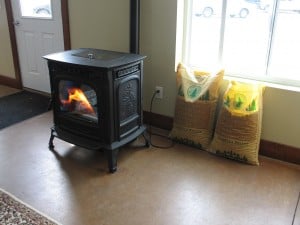Would you like to buy a $1,000 pellet stove at half price? Last month, the Forest Service announced that it is happy to pay the other half to promote “leveraging the market for low value wood.”
To get in on this gravy train, find 100 people who want to buy a new pellet stove (a good use of social media). Call yourselves a “biomass consumer cooperative” with a $500 membership fee — half the stove’s cost. The Forest Service will then grant your “cooperative” $50,000 to pay for the other half. What a deal! Now you and your 99 new friends can enjoy a sweet new pellet stove to warm your house at half-price! If you’d prefer cash, just turn around and sell your new stove on eBay for $800, pocketing a cool $300 profit!

You can always trust the FS to come up with great ideas for how to abuse our forests and taxpayers.
Perhaps they should change their motto to:
Screwing our forests; warming the people.
I actually knew the consultant that coined the phrase “Serving the people and caring for the land.” However, before I knew this we were out to dinner when I started I had heard a parody on the jingle: “Screwing the people raping the land.” When the consultant nearly bit off the end of a fork, I put 2 and 2 together.
“Carving the land and scaring the people.”
This is a more honest and transparent strategy then what the Forest Service and Sealaska Corp did in Southeast Alaska.
To create a new market in SE Alaska the Forest Service and Sealaska Corp converted their offices from fuel oil to pellets. A token effort to encourage a large scale regional conversion. However, this was a paltry start and they needed much more. So they pushed State of Alaska to promote residential use of pellets in their comprehensive energy plan which included fuel oil, heat pumps, conventional wood stoves, hydro, etc. but the public was hearing nothing of it. Then the push was to get several public schools to convert to pellets — which has its own health risks, carbon accounting problems and is now more expensive than oil.
But perhaps the best irony is a big Coast Guard promoter who convinced the Coast Guard Station in Sitka to supplement its energy needs on the basis that oil prices would never go down. Well oil prices did drastically fall and unfortunately the pellet boiler blew up and injured personnel. The entire pellet operation shutdown and was sold to the community of Haines at a step discount. The CG promoter has since moved on and has acquired a new middle name — Boom Boom.
I have looked at the pellet numbers and they do not pan out on either the demand or supply side. But perhaps someday.
Former Regional Economist, J.R. Mehrkens
I hope this is a hoax. If not what is the oversight and quality control? Who verifies the 100 people in each cooperative? Who gets the 50 grand to distribute and who validates the money is distributed in timely manner? . Who determines if the stoves are even purchased?
How do you heat your home Andy? Natural gas? Oil? I get the not in my back yard argument but personally I would rather not get my heat source from fracking or Nigerian delta oil. The profit potential from biomass is so small that we will never see our forests clear cut to generate wood pellets. Environmental groups made sure of that by pushing in an amendment to the renewable fuels language saying that biomass originating from federal lands are not eligible for RIN credits. Biomass (outside of Europe) only works on small scale local levels. It is at that level that it has great potential to generate meaningful change to address wildfire hazard concerns. You should take a look at the Blue Mountains in Oregon. There is some really progressive biomass work being done by the city of John Day and companies like Wallowa Resources.
If I ever did pellets, it would be central hot water with a stoker. Scale matters.
The small haul-radius on biomass (which hangs on fuel prices, too) inherently limits the concept, but on an avoided-loss basis, where the choice is burn it raw or burn it efficient, I can’t think of a better way to manage cruddy wood in a cost-effective manner.